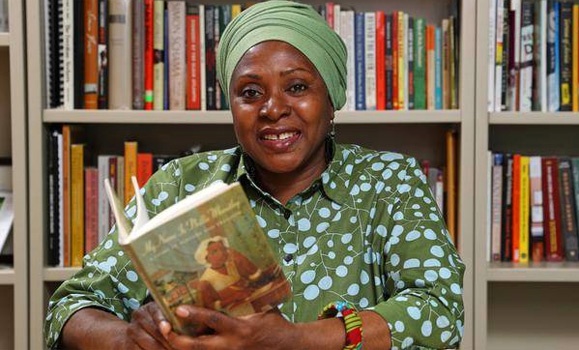Halifax’s new Poet Laureate is a familiar face to the Dal community.
Dr. Afua Cooper, the most recent James R. Johnston Chair in Black Canadian Studies at pilipiliÂţ», was installed on Tuesday (April 24) as .
Dr. Cooper, a faculty member cross-appointed to the Departments of History and Sociology & Social Anthropology, will serve a two-year term as “an ambassador and advocate for literacy, literature and the arts” in the city.
“That’s such a beautiful mission,” says Dr. Cooper, speaking about her new appointment. “I look forward to being this ambassador for the city, within the city itself and outside of the city as well.”
Watch:
Dr. Cooper follows in the footsteps of several other Dal-affiliated individuals to take on the Halifax Poet Laureate mantle. Her predecessor, Rebecca Thomas, is a Dal alumnus (BA, MA), as are past Poet Laureates El Jones (PhD) and Shauntay Grant (BMusc). Grant is currently a lecturer in the Department of English.
Elevating voices
The Poet Laureate’s official role is to perform poetry at civic events and activities. But other than a requirement to conduct poetry readings at number of Halifax council meetings during their tenure, the particulars of the position are largely up to the discretion of the individual poet, including which requests they entertain. Each of the women in the role — so far, every Halifax Poet Laureate has been female — has left their own mark on the position, and Dr. Cooper will be no different.
“I’d like to engage different voices, and to really tap into what HRM has to offer in terms of the literary arts,” she explains. “As much as possible, I’d like to engage other people, other poets, other storytellers — many of whom are new to HRM. I want to use poetry as a way to get people into thinking and believing that Halifax is also their city.”
Dr. Cooper is an immigrant herself, arriving in Canada in 1980 after growing up in Kingston, Jamaica. And while her time at pilipiliÂţ» and in Halifax may be better known for the education, research and advocacy aspects of her varied career — launching Dal’s Black and African Diaspora Studies, leading the in-progress Lord Dalhousie panel, receiving the Nova Scotia Human Rights Award, among so many other noteworthy contributions — her life has been equally as driven by her artistic pursuits.
She’s considered a pioneering voice in Canadian dub poetry and spoken word, performing all over the world. She has published five books of poetry and also writes young adult fiction as well. She organized the first International Dub Poetry Festival and Conference in 2002 and helped found the Toronto Dub Poets Collective.
Dr. Cooper also established the Black Canadian Studies Association, was shortlisted for the Governor General’s Literary Award for her 2006 book The Hanging of Angélique, and co-created Black Halifax, an interactive multidisciplinary project celebrating Halifax’s Black community.
Collisions and intersections
Similar to Black Halifax, Dr. Cooper sees her new role (which she will fulfill alongside her Dal commitments) as an opportunity to shed new light on the city’s history, culture and civic life.
“We put emphasis on so many things as people living in a city: on the economy, on building roads and highways, homes and daily life, on material things you can touch…. I see poetry as an instrument that can flesh out all these things. It’s such a multilayered, multidimensional instrument. It takes us away from the material and allows us to focus on beauty — not in a physical sense, but a way of thinking about the world, a way of looking at the world from another perspective.”
She also expects her diverse expertise to influence her two years as Poet Laureate. At her installation ceremony at City Hall on Tuesday, she spoke about how being able to see the harbour through the window, and how it led her to reflect on how her slave ancestors made the perilous journey across the Atlantic — echoing a topic that has consumed a great deal of her scholarly pursuits.
“Nowadays we often use the word intersectionality: everything is colliding and intersecting, and out of that comes poetry for me,” says Dr. Cooper. “That’s one example of where all my worlds collide into the creation of this thing that’s poetry.”

